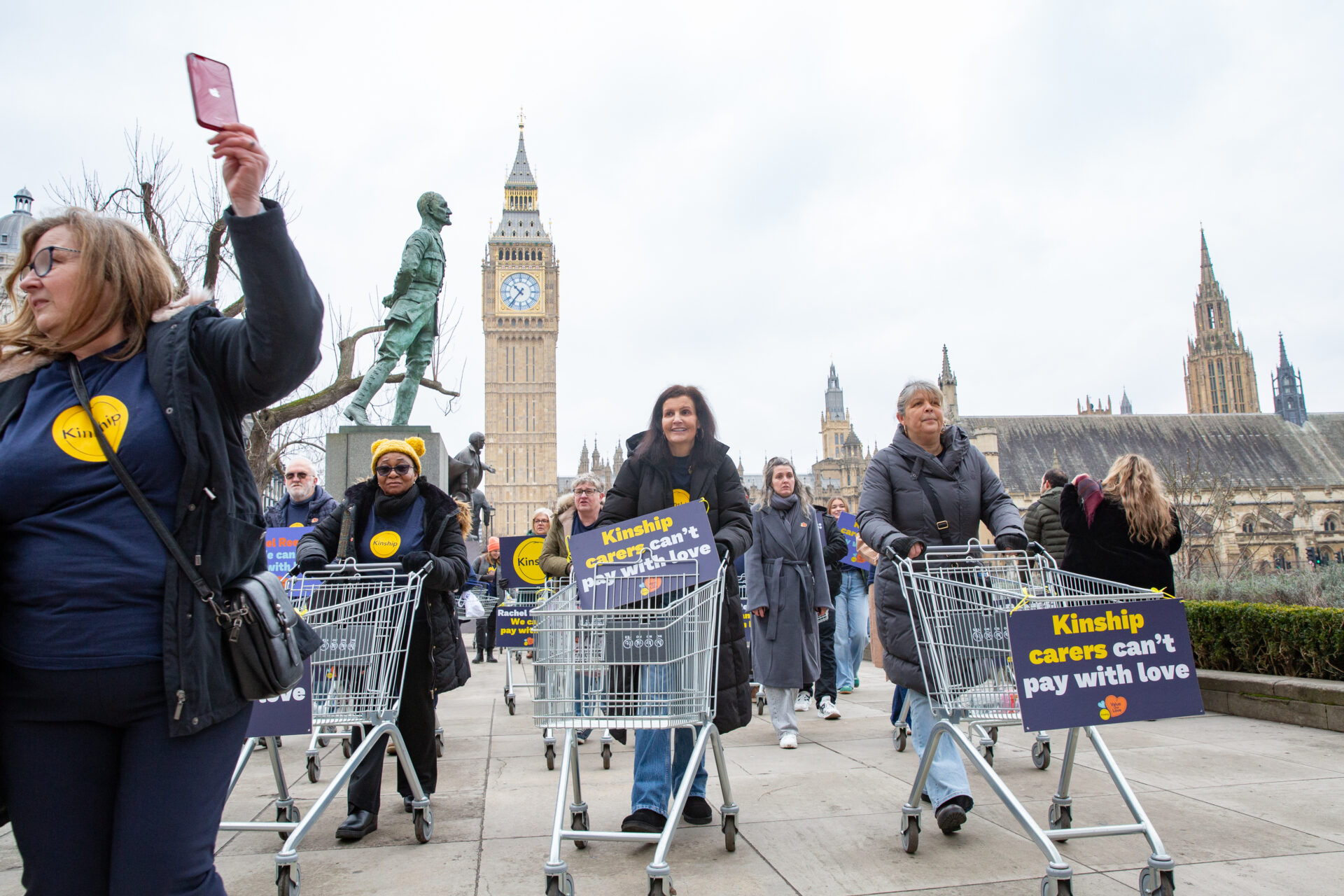
On 12 February 2025, over 30 kinship carers marched to the Treasury to demand a financial allowance for all kinship carers. Find out what prompted this action.
There is an open expression of interest for local authorities to participate in the Kinship Allowance Pilot.
Slow progress
Previous status: No progress (October 2024); Slow progress (October 2024)
Click on the link below to take you to the section you'd like to read:
The government announced on 17 June 2025 details of the long-awaited Kinship Allowance Pilot following a commitment made in the Autumn Budget 2024. The pilot will provide financial support for eligible kinship carers in up to 10 local authority areas, paid at an equivalent rate to the fostering National Minimum Allowance (NMA), to understand how improved financial support for kinship carers helps to minimise the risk of kinship placement breakdown, enables kinship families to consider arrangements outside of the care system, and subsequently alleviate cost pressures on local authorities.
Kinship has compiled Frequently Asked Questions specifically for kinship carers which will be reviewed and kept up to date as we learn more.
Some local authorities already deliver a consistent, non means tested financial allowance for some groups of kinship carers (most commonly special guardians where the child was previously looked after) and several local authorities have recently announced plans to strengthen their offers of financial support to kinship carers, including Kirklees, Leeds and Sheffield. However, most local authorities continue to deliver only discretionary means tested financial support to some kinship carers (other than kinship foster carers).
The previous government committed in the National Kinship Care Strategy to delivering a 4-year financial allowances pathfinder in up to 8 local authorities from 2024 to28, with £16 million funding committed to for year one (2024-5). Only special guardians where the child was previously in care were due to be eligible for an allowance which matched the minimum fostering allowance in that local authority. Although further details were expected in Spring 2024, the then government’s response to a parliamentary written question suggested a delay even prior to the general election.
Previously, Stable Homes, Built on Love committed to “explore the case for mandating” a mandatory financial allowance across all local authorities following the Independent Review of Children’s Social Care’s recommendation in 2022 that financial allowances be extended to all special guardians and kinship carers with child arrangements orders where the child would otherwise be in care. The government’s strategy agreed with Review’s assessment that the current system perversely incentivises kinship carers to become foster carers given this can be the only route to access financial support, and acknowledged this can be a barrier to permanence for children who would otherwise be cared for under a different legal order.
In Stable Homes, Built on Love, the government argued that improving financial support “often makes good financial sense for local authorities, kinship carers and, ultimately, for children and their outcomes”. It argued the provision of flexible funding for kinship arrangements makes economic sense, noting that some local authorities had seen a financial benefit – particularly where this has reduced the numbers of children in care – and encouraged others to follow suit: “we do not want local authorities and partners to feel the need to wait for permission to act now… [local authorities] should feel confident to pursue approaches and ways of working that we know are the right ones”.
The Lords Public Services Committee has previously encouraged the government to go further and suggested that it “should ensure that sufficient financial support for those caring for their kin is provided regardless of whether the arrangement is formal or informal, and that it is consistent across England. Additional funding should be allocated to local authorities to provide this support in the immediate future.” In addition, the previous Education Committee acknowledged that “many kinship carers live in poverty, and many begin looking after a child in a time of crisis. The case for additional financial support for kinship carers, as well as ‘kinship leave’ on par with Adoption Leave must be reviewed”.
We are pleased the government is moving ahead with plans to trial improved financial support for kinship carers given our extensive evidence of the impact of poor financial support on kinship family poverty and stability. However, it is vital that the trial does not paralyse progress towards a wider rollout of allowances in the future. We also remain concerned that informal kinship families will continue to be excluded from financial support given our and wider evidence they are the least likely to be recieiving support whilst having very similar needs and experiences of financial insecurity to other families.
The government’s rationale for an extended pilot – rather than the introduction of a mandatory financial allowance across all local authorities as called for by our #ValueOurLove campaign – is that it needs to first understand further how consistent financial support helps to keep children within their families and in kinship arrangements outside of local authority care, and to test how best to deliver the allowance in practice.
However, we know that local authorities who have already moved to equalising financial support between kinship carers and foster carers – including Kirklees, Leeds and Sheffield – are doing so because of the positive experiences and outcomes it delivers for children, families and their budgets. In the meantime elsewhere, financial support for kinship families across the country will remain inadequate and extremely variable, subject to a postcode and legal lottery. It makes sense to invest in kinship care: our evidence shows that, for every 100 children looked after in well-supported kinship care rather than local authority care, the state saves £4 million per year and increases the lifetime earnings of those children by £2 million.
We’re also pleased to see our direct expertise and campaigning reflected in the pilot’s aims and eligibility, including:
On the latter point above, we had raised concerns over the government’s earlier ambition to evidence how improved financial support might increase the number of children living in kinship care by diverting children from the local authority care system, echoing the government’s wider children’s social care objectives articulated through other provisions included within the Children’s Wellbeing and Schools Bill and the Keeping Children Safe, Helping Families Thrive policy paper.
This would be a much more difficult challenge given how the mechanics of the system effectively dictate children’s initial entry to the care system when deemed at risk of significant harm by the local authority and the absence of any well-supported kinship care routes which are not predicated on the child having spent some time in local authority care.
As such, any isolated trial of a financial allowance would be unlikely to deliver the right testing ground to evidence initial diversion from care and could risk kinship families being pushed down routes which have long-term implications for eligibility for other practical and emotional support, as we have too raised in the context of a new legal duty on local authorities to offer Family Group Decision Making (FGDM).
We welcome those local authorities who have followed the evidence and already deliver leading practice in financially supporting special guardians and other kinship carers. Elsewhere, guidance on the provision of financial support for kinship carers continues to be misunderstood and delivered poorly – and sometimes unlawfully – in practice, leading to highly variable experiences for kinship carers and leaving local authorities open to legal challenge, evident in a number of recent successful judicial challenges and Ombudsman complaint decisions.
We urge the Department for Education to work transparently and at pace to roll out the pilot so that kinship carers across England can understand how it might impact them, and to use early findings from the evaluation to iteratively improve delivery of the pilot and to understand how it might inform a wider rollout in the future.
Ultimately, we want to see a commitment made by the government to legislate for and appropriately fund a consistent offer of financial allowances nationally for all kinship carers.
Regardless of if they are selected to be part of the pilot, local authorities should emulate the leading practice of local authorities who already deliver a non-means tested allowance to kinship carers as soon as possible, and ensure financial issues do not prevent kinship carers from moving to a kinship arrangement best suited to their family situation. This aligns with Foundations’ Kinship Care Practice Guide which recommends that kinship carers should be offered a financial allowance “to increase placement permanency, reduce the likelihood of placement disruption and improve the likelihood of permanent guardianship”.
To support this, the government should also commit to updating special guardianship guidance to reduce current unacceptable variation and poor practice in the delivery of financial support, reiterating that “financial issues should not be the sole reason for a special guardianship arrangement failing to survive” and offering clarity to local authorities in the absence of an up-to-date and suitable means testing model. Guidance should also encourage equitable provision of suitable financial support to kinship carers with child arrangements orders, and local authorities should offer support to kinship carers with these arrangements who wish to move to special guardianship when in the best interests of the child.
Four times more likely to have had a direct debit, standing order or bill they weren’t able to pay in the last month
8% of kinship carers were using food banks because of increases in the cost of living
£4.3 billion the economic value of kinship care in England per year

On 12 February 2025, over 30 kinship carers marched to the Treasury to demand a financial allowance for all kinship carers. Find out what prompted this action.

Our analysis of government data and survey insights highlight the positive impacts which improved financial support would bring for families and the state.

'Make or Break' shares key findings from Kinship’s 2024 annual survey of more than 1,300 kinship carers.